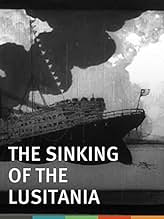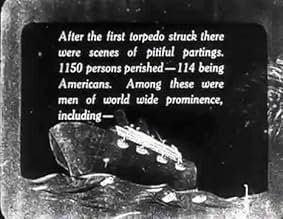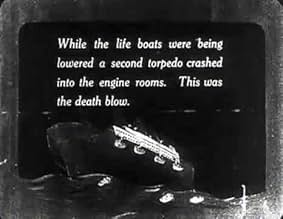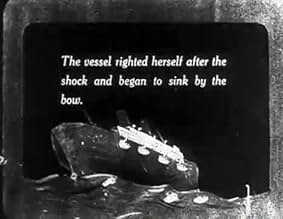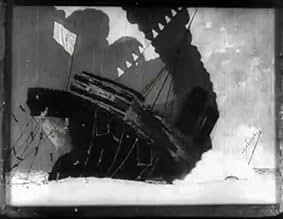IMDb RATING
6.8/10
1.3K
YOUR RATING
An animated dramatization of the notorious World War I German torpedoing of the ocean liner, Lusitania.An animated dramatization of the notorious World War I German torpedoing of the ocean liner, Lusitania.An animated dramatization of the notorious World War I German torpedoing of the ocean liner, Lusitania.
- Director
- Writer
- Star
- Awards
- 1 win total
- Director
- Writer
- All cast & crew
- Production, box office & more at IMDbPro
Featured reviews
The Sinking of the Lusitania (1918)
*** (out of 4)
This WWI propaganda piece is from Winsor McCay, the famed animator who decided to use his skills and so something quite different. This film documents the German attack on the Lusitania ship, which was carrying 2000 people when it was hit by a couple torpedoes and sank fifteen-minutes later. The film clocks in at twelve-minutes and the animation is used to show what happened and then we're given actual footage talking about how evil Germany is and we also have a brief tribute to some of the men who were lost. This is a fairly interesting film on many levels but the biggest is because of all the fire and passion that McCay brings to the material. There's no doubt that this was a very personal film to him and he clearly makes his feelings known by attacking Germany on pretty much every level. There's no question that the gloves are off as the title cards are quite damning to the actions that were done that day. The animation of the boat sinking is quite simple on one hand but I'd argue there are still some very striking moments here. I think the greatest are the shots of the ship and the smoke coming from it. The long, complete shots of the ship are quite striking in their animated form and just watch the way that the smoke comes off of it. The previously mentioned tribute shows some of the famous people that died on the ship, which was somewhat questionable and especially since none of the other victims are even mentioned and no tribute is given to them. With that said, this is still very much worth seeing just for the passion that it displays.
*** (out of 4)
This WWI propaganda piece is from Winsor McCay, the famed animator who decided to use his skills and so something quite different. This film documents the German attack on the Lusitania ship, which was carrying 2000 people when it was hit by a couple torpedoes and sank fifteen-minutes later. The film clocks in at twelve-minutes and the animation is used to show what happened and then we're given actual footage talking about how evil Germany is and we also have a brief tribute to some of the men who were lost. This is a fairly interesting film on many levels but the biggest is because of all the fire and passion that McCay brings to the material. There's no doubt that this was a very personal film to him and he clearly makes his feelings known by attacking Germany on pretty much every level. There's no question that the gloves are off as the title cards are quite damning to the actions that were done that day. The animation of the boat sinking is quite simple on one hand but I'd argue there are still some very striking moments here. I think the greatest are the shots of the ship and the smoke coming from it. The long, complete shots of the ship are quite striking in their animated form and just watch the way that the smoke comes off of it. The previously mentioned tribute shows some of the famous people that died on the ship, which was somewhat questionable and especially since none of the other victims are even mentioned and no tribute is given to them. With that said, this is still very much worth seeing just for the passion that it displays.
10Woody-61
Although Winsor McCay is primarily known for such whimsical flights of fantasy as "Gertie the Dinosaur" and the comic strip "Little Nemo in Slumberland", this recreation of the great ocean-liner tragedy is just as remarkable. Painstakingly realistic, the graphic detail and fluidity of motion in this cartoon are far ahead of their time. This was actually the first film to use cel animation, as the amount of detail McCay envisioned would have made drawing each picture individually near impossible. In fact, you really have to look closely at the human figures to tell that it isn't actual live footage. The torpedoes striking the hull, the subsequent explosions, the lifeboats and ropes flying over the sides, the passengers jumping overboard, the attempts at rescue, and the tragic fates of those unfortunates adrift in the ocean are all wonderfully and harrowingly realised. That the quality of this film isn't in the greatest condition anymore (at least the print of it I saw wasn't) somehow only makes it feel even more authentic. The final shot packs an emotional wallop infinitely greater than anything in Cameron's TITANIC.
This is a tough animated film to rate, as in some ways this is a wonderful film and in others it's lousy. When it comes to mobilizing the American public to demand war and volunteer to fight abroad, it was top-notch propaganda. It did so much to justify our entry into the war to destroy the evil Hun! But, history has shown us a lot that was not discussed in the film. First, the Lusitania was not an innocent passenger liner. Recent dives have found detonators and other contraband were being carried on this passenger liner. Second, the Germans were at fault for this pointless war--as were the Russians, Austria-Hungarians, French, British, etc.! And third, although widely circulated during the war as a deliberate hoax, the Kaiser did NOT decorate the captain of the sub for sinking the Lusitania!! If you ignore all the controversy above and just focus on the quality of the animation, for 1918, this is an amazing film. Well animated with excellent backgrounds and a jerking and super-effective finale featuring a drowning mother and her child--this is an amazing film. While most today would probably find the animation primitive and dull, for its time it was terrific. Too bad the central message is so fatally flawed and inaccurate.
The RMS Lusitania was a British ocean liner laid down in 1904, but achieved worldwide notoriety after it was attacked and destroyed by a German submarine off the coast of Ireland during World War I. This short film by famed American cartoonist and animator Winsor McCay briefly goes over what happened in a dramatized way in order to basically serve as propaganda. By this point, the german empire had publicly declared unrestricted submarine warfare, meaning that any non-military ships carrying harmless supplies like food or oil can and will be sunk without any warning. Like in 1914, the germans feel that stating their intentions acts as a disclaimer to any destruction they cause. They even go to the extent of publishing warnings authored by their embassy in New York newspapers, as the short says. The ship had just left here and was supposed to be arriving in Liverpool soon, but this was not to be. While cruising at 18 knots near southern ireland, the Lusitania was hit just behind its bridge by a torpedo launched by the U-boat U-20. While the order was given to abandon ship, the lifeboats were only about halfway lowered when a second torpedo slammed into the engine compartment. Like a knife to the heart, the Lusitania was shook like never before. After this, the ship stabilizes itself but begins to sink, starting with its bow. Just 15 short minutes after it was first hit, the Lusitania disappears under the sea. According to the short, the Kaiser gave the captain of the submarine a medal for his heinous act. Although the Lusitania's loss was a serious shock all over the world, one thing allowed McCay to dramatize and animate it the way he did: the sinking wasn't photographed. The ending of the film is pretty disturbing, as it shows a woman trying to keep her baby on the surface of the water as the ship sinks nearby. A few years before this, McCay had completed Little Nemo, his first animated film which he made from 4000 individual drawings on rice paper. For this film, he would use over 6 times that number, which just makes my mind go numb thinking about how someone can commit themselves to that. Interestingly, papers owned by William Randolph Hearst (McCay's boss) tried to make the Lusitania event seem not that bad, as Hearst did not want America in the war. However, McCay was obligated to draw pro-isolationist cartoons for Hearst's publications. To demonstrate how insanely slow this style of animation progressed, it was said that it took McCay 2 months just to make enough film to last 8 seconds. For someone like McCay who was mostly known for funny cartoons, this is undoubtedly his most serious production, and it still angers and shocks people today to learn about what germany was doing in the first world war. Gas attacks, flamethrowers, this, list goes on and on. It's also pretty realistic looking, such as when you see people jumping over the side of the ship or the U-boat cutting through the waves. As important as this film is (it's probably the world's oldest animated documentary), Hearst was not happy with what McCay was doing a few years later. In the early 20s, when he discovered that McCay was more concerned with animation than his papers, he ordered him to give it up. While the new process of utilizing cel animation with a static layer underneath might have made things easier, it still took McCay a huge amount of time to make this relatively short movie. Because of its historic status as the oldest animated documentary, I think this is something all people interested in history should see.
America had entered the war by the time Winsor McCay released this film. The sinking of the Lusitania, which carried munitions as well, swayed American sentiment, but not until Germany retracted its guarantee of not repeating the tragedy, among other issues of course, did the US ally. McCay's masterpiece was surely as worthy propaganda as posters, as there was still fight to last a few more months.
By 1918, the celluloid animation process had been invented. John Fitzsimmons and Apthorp Adams providing such as the waves with less monotony to the task, and McCay is supposed still to have created some 25,000 drawings for the production. As he had done with previous shorts, McCay produced a live-action introduction promoting his dedication and hard work. His last film, "Gertie the Dinosaur", drawn on rice paper before the advent of cel animation, was the most accomplished work of animation to date. Yet, with a cliché not to be used lightly, "The Sinking of the Lusitania" was ahead of its time--years before the assembly lines of animation studios would attain such splendor. Where Gertie was a likable, coy cartoon--one of the first personated characters in animation, this short is a moving tragedy transcending to likeness re live-action.
It likens a subjective docudrama styled as a propaganda newsreel. It contains shots impossible to have covered, impossible to have recreated in a live-action film as of then, although probably thought impossible to create in animation until McCay did it. The framing and positioning is apt, the detail meticulous. There was little need for me to screen this film again before writing this comment; images of the ocean liner steaming past the Statue of Liberty, floral smoke arising from the torpedo hits, rhapsodic falling bodies, bobbing heads and the isolated sinking in the final shot to punctuate the event, I'll always remember.
By 1918, the celluloid animation process had been invented. John Fitzsimmons and Apthorp Adams providing such as the waves with less monotony to the task, and McCay is supposed still to have created some 25,000 drawings for the production. As he had done with previous shorts, McCay produced a live-action introduction promoting his dedication and hard work. His last film, "Gertie the Dinosaur", drawn on rice paper before the advent of cel animation, was the most accomplished work of animation to date. Yet, with a cliché not to be used lightly, "The Sinking of the Lusitania" was ahead of its time--years before the assembly lines of animation studios would attain such splendor. Where Gertie was a likable, coy cartoon--one of the first personated characters in animation, this short is a moving tragedy transcending to likeness re live-action.
It likens a subjective docudrama styled as a propaganda newsreel. It contains shots impossible to have covered, impossible to have recreated in a live-action film as of then, although probably thought impossible to create in animation until McCay did it. The framing and positioning is apt, the detail meticulous. There was little need for me to screen this film again before writing this comment; images of the ocean liner steaming past the Statue of Liberty, floral smoke arising from the torpedo hits, rhapsodic falling bodies, bobbing heads and the isolated sinking in the final shot to punctuate the event, I'll always remember.
Did you know
- TriviaAs First Lord of the Admiralty Winston Churchill allowed civilian ships to transport war munitions for the Western Front. He prevented German U-Boats from searching the ships by illegally arming merchant ships, introducing Q-ships with concealed deck guns, and by ordering merchant captains to evade and submarines that surfaced.
- GoofsThe German submarine fired only one torpedo, not two. The second explosion originated from within the ship near where the torpedo hit. The cause still remains uncertain. It has been widely speculated that the second explosion was caused by war munitions the ship was illegally transporting for the Western Front.
- ConnectionsEdited into Los comienzos de la animación (1995)
Details
- Release date
- Country of origin
- Languages
- Also known as
- The Sinking of the 'Lusitania', an amazing moving pen picture by Winsor McCay.
- Production company
- See more company credits at IMDbPro
- Runtime12 minutes
- Color
- Sound mix
- Aspect ratio
- 1.33 : 1
Contribute to this page
Suggest an edit or add missing content

Top Gap
By what name was The Sinking of the 'Lusitania' (1918) officially released in Canada in English?
Answer
